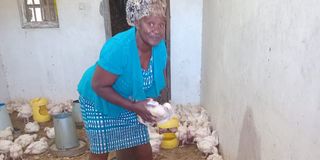After years of losses, this is how I started making a profit in poultry farming

Esther Kiarie attending to her poultry at her farm in Bahati.
For Esther Kiarie, poultry farming is more than a livelihood; it's a passion. Despite the hurdles she has faced, she would choose the same path again in a heartbeat.
Esther currently runs a farm of 300 broilers and 2,500 layers. However, she admits that maximising profits from her poultry business has been a long struggle.
"Even after twelve years of farming, I've often made minimal profits despite considerable investment. The cost of production is high, but I've never given up," she says.
Esther observes that many poultry farmers lack the knowledge needed to avoid losses and make their farms profitable.
Her colleague, Isabella Ondabu, was once involved in poultry farming for five years, but eventually decided to quit because of persistent losses.
"I didn't understand the economics of poultry farming. I reached a point where I was exhausted by the lack of reward for my efforts," Isabella recalls.
She admits that her lack of understanding about proper feeding, housing, vaccination and record keeping contributed to her struggles.

Members of Kiamunyeki Broiler Farmer Field School in Bahati being trained on chick management.
To address these challenges, Esther and Isabella, along with other local farmers, have formed the Kiamunyeki Broiler Farmer Field School in Bahati. Here they learn strategies to improve productivity and adopt best practices in poultry farming.
Since joining the group, Esther has significantly improved her farming techniques, particularly in managing chick temperatures and keeping detailed records.
"I never kept proper records before, but now I can track my expenses and assess whether I'm making a profit or loss. I've also learnt how to regulate the temperature for the chicks when they arrive," she explains.
Esther has also found a new source of income by slaughtering her own chickens and selling the internal organs as virenje, which has boosted her income.
Isabella also acknowledges that the training has been transformative, especially for the women in the community.
"We were taught best practices in poultry farming, which can improve women's livelihoods by enabling them to generate their own income and achieve financial independence," she says.
Poultry farming is often considered a women's activity in many households, and Isabella believes that equipping women with the right skills can empower them financially.
As they continue to learn through the Farmer Field School, both Esther and Isabella are optimistic about increasing their income and inspiring other community members to take up poultry farming.

